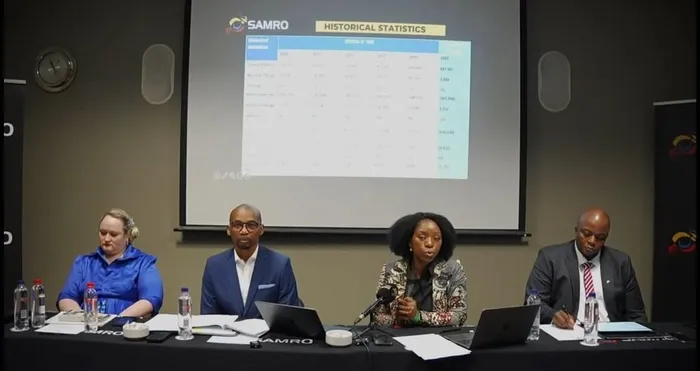Musicians demand unpaid royalties at chaotic Samro conference

The Samro press briefing was initially held to addressed and clarify the distinction between facts and misinformation concerning Samro governance matters.
Image: Instagram.
Chaos recently erupted at a press conference organised by the Southern African Music Rights Organisation (Samro) to discuss internal issues.
Frustrated musicians stormed into the briefing demanding their unpaid royalties.
Among the musicians were "Ayashisa Amateki" hitmaker Mercy Pakela, Sithembile Zungu from the famous 80s group Dalom Kids and William Mthethwa, who is well-known for his singles, "Give Me Your Love" and "Cost Of Living Is Too High".
They expressed concerns about their long-overdue payments that they claim Samro owed them.
Owen Ndlovu, Tshepo Mashiane, Mfanafuthi, Nico Dumakude and Tebogo Sithathu were also a part of the disruption.
The conference, which was held at the Garden Court Hotel in Milpark, Johannesburg, on September 10, was initially intended to address internal disputes and the recent suspension of chief operations officer Mpho Mofikoe, who faced allegations of disclosing fraudulent activities.

Mercy Pakela.
Image: Instagram.
Pakela was vocal about the transparency of Samro: "What they are doing is affecting our lives. There’s a lot of corruption at Samro, and when people point out that the board has not been honest, they are then sidelined or kicked out. It’s not about us any more, but the truth is, Samro belongs to us."
Mthethwa, a Samro member for 50 years, added that he has 564 songs registered with the organisation and that they owe him a staggering R2 million.
Another member, Tshepo Mashiane, said: "I had to re-register myself after finding out he was no longer in Samro's system."
Musicians further alleged that the money is being wrongly distributed, with Mashiane insisting that "some publishers are sitting on the board, taking money from ordinary musicians".
Meanwhile, Samro’s board chairperson, Nicholas Maweni, acknowledged the disruptions but defended the organisation.
He said that they needed to focus on all members’ needs: "We distribute millions of rand to members."
Maweni also said that some artists' music is "not being played on the radio", making it hard for them to earn royalties.
The tension arises from allegations of corruption and financial mismanagement worth R3.4 million within Samro, which is currently being investigated by the police.
Samro’s CEO, Annabelle Lebethe, confirmed that the board followed proper procedures in reinstating certain members who had previously been removed due to the investigation.
"We will continue to manage the copyright assigned to us and work in the best interests of our members."
She also reassured that Samro remains operational and continues with music licensing and distributing funds to artists.
"We are working in the best interest of our members. It’s our responsibility and obligation."

Samro CEO Annabell Lebethe.
Image: File.
In December, Samro reached unprecedented financial growth, achieving the highest revenue ever and the lowest Cost-to-Income (CTI) ratio in ten years.
They reported a notable 15.2% rise in Total Company Licence Revenue, increasing from R593.7 million in 2023 to R683.8 million in 2024.
They also shared that in the 2023/2024 financial year, Samro distributed a record-high amount of R429 million to its members, reflecting a 63.8% increase from the previous year.
At the time, Lebethe said that the impressive financial performance set the stage for Samro’s ambitious growth strategy moving forward.
"We have adjusted our strategic goals, raising our revenue target from R1 billion to R1.2 billion by 2028."
Watch the press briefing below.